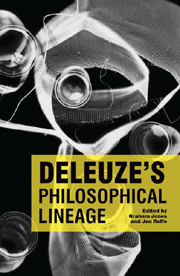Book contents
- Frontmatter
- Contents
- Acknowledgements
- List of Abbreviations
- Introduction: Into the Labyrinth
- 1 Plato
- 2 John Duns Scotus
- 3 G. W. F. Leibniz
- 4 David Hume
- 5 Immanuel Kant
- 6 Solomon Maimon
- 7 G. W. F. Hegel
- 8 Karl Marx
- 9 Hoëne Wronski and Francis Warrain
- 10 Bernhard Riemann
- 11 Gabriel Tarde
- 12 Sigmund Freud
- 13 Henri Bergson
- 14 Edmund Husserl
- 15 A. N. Whitehead
- 16 Raymond Ruyer
- 17 Martin Heidegger
- 18 Pierre Klossowski
- 19 Albert Lautman
- 20 Gilbert Simondon
- Bibliography
- Notes on Contributors
- Index
13 - Henri Bergson
Published online by Cambridge University Press: 12 September 2012
- Frontmatter
- Contents
- Acknowledgements
- List of Abbreviations
- Introduction: Into the Labyrinth
- 1 Plato
- 2 John Duns Scotus
- 3 G. W. F. Leibniz
- 4 David Hume
- 5 Immanuel Kant
- 6 Solomon Maimon
- 7 G. W. F. Hegel
- 8 Karl Marx
- 9 Hoëne Wronski and Francis Warrain
- 10 Bernhard Riemann
- 11 Gabriel Tarde
- 12 Sigmund Freud
- 13 Henri Bergson
- 14 Edmund Husserl
- 15 A. N. Whitehead
- 16 Raymond Ruyer
- 17 Martin Heidegger
- 18 Pierre Klossowski
- 19 Albert Lautman
- 20 Gilbert Simondon
- Bibliography
- Notes on Contributors
- Index
Summary
Henri Bergson (1859–1941) was perhaps the most popular Western philosopher in the first decade of the twentieth century, with his works being translated shortly after the appearance of the French editions and his lecture tours extending as far as the United States. The esteem in which his work was held could be attributed to both the artfulness of his prose – he won the Nobel Prize for literature in 1927 – and the timeliness of his ideas. His most celebrated argument that time must endure was a response to the evolutionary theories of Herbert Spencer but, more importantly, presented an alternative to the widespread influence of mechanism in the natural sciences. His theory of memory, which accepted that there is always a retention of the past in the present, led to his radical reworking of the mind- body dualism and, by a circuitous route, to the belief that evolution is driven by a creative impulse (élan vital).
Gilles Deleuze is largely responsible for the renewed interest in the philosophy of Bergson, which was laid to rest in many circles as far back as 1962, only fifty years after the height of its popularity. In the early part of the twentieth century Bergsonism had influenced a range of fields including the phenomenological tradition, artistic practice and even social policy. The waning of interest in Bergson's work was not a gradual process, where each of his arguments was tested in a philosophical context; rather, there was a sudden and vehement rejection of the philosophy as a whole, so great that Western philosophy in the period following the Second World War has been characterised by some thinkers as anti-Bergsonian.
- Type
- Chapter
- Information
- Deleuze's Philosophical Lineage , pp. 237 - 260Publisher: Edinburgh University PressPrint publication year: 2009



